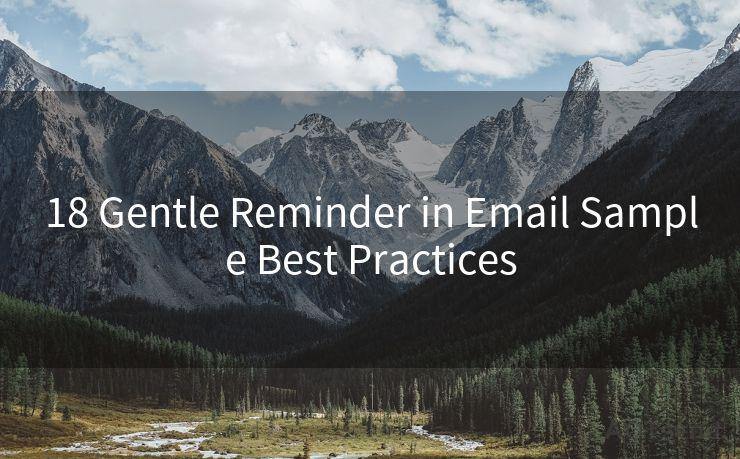18 Gentle Reminder in Email Sample Best Practices




Email reminders are a crucial part of professional communication, especially when following up on pending tasks, meetings, or deadlines. Crafting a gentle reminder email requires finesse to ensure it's neither too pushy nor too passive. Here are 18 best practices for writing effective and polite reminder emails.
1. Clear and Concise Subject Line
Start with a subject line that clearly states the purpose of your email, such as "Gentle Reminder: Upcoming Meeting on XYZ Project." This helps the recipient understand the email's intent immediately.
2. Personalized Greeting
Always use a personalized greeting, such as "Dear [Recipient's Name]," to make your email more approachable and less impersonal.
3. Express Gratitude
Begin by thanking the recipient for their time or previous efforts. This sets a positive tone for the rest of the email.
4. State the Purpose
Get to the point quickly but politely. For example, "I'm writing to gently remind you about our upcoming meeting on the XYZ project."

5. Provide Context
Include relevant details, such as the date, time, and location of the event or deadline you're reminding them about. This helps refresh their memory and reduces confusion.
6. Use Polite Language
Phrases like "I would kindly request" or "I would appreciate it if" convey urgency without being demanding.
7. Attach Relevant Documents
If there are supporting documents or agendas for the meeting, attach them for easy reference.
8. Offer Assistance
Show willingness to help by asking if there's anything you can do to facilitate the process or prepare for the meeting.
9. Confirm Receipt
Request a confirmation of receipt to ensure your message has been received and understood.
10. Avoid Excessively Formal Language
While professionalism is essential, overly formal language can make your email sound distant. Opt for a friendly yet professional tone.
11. Check Grammar and Spelling
Errors in grammar or spelling can detract from your message's professionalism. Use tools like Grammarly to proofread your email before sending.
12. Follow Email Etiquette
Stick to standard email etiquette, such as using proper salutations, closings, and avoiding all-caps or excessive exclamation marks.
13. Consider Time Zones
When scheduling meetings or deadlines, be mindful of the recipient's time zone to avoid inconvenience.
14. Use Templates Wisely
While templates can save time, customize them enough to ensure they don't sound impersonal or automated.
15. Test Email Deliverability
Occasionally check if your emails are reaching the recipient's inbox and not being marked as spam.
16. Follow Up Appropriately
If no response is received, send a follow-up email after a reasonable period, maintaining the same polite and professional tone.
17. Know Your Audience
Tailor your language and approach based on the recipient's culture, position, and preferences.
18. Close Positively
End your email on a positive note, thanking them again for their attention and looking forward to a favorable response.
Incorporating these best practices into your gentle reminder emails will ensure clear, effective, and polite communication, enhancing professional relationships and increasing the likelihood of a timely response.




🔔🔔🔔
【AOTsend Email API】:AOTsend is a Managed Email Service for sending transactional emails. Support Email Types: reminders, authentication, confirmations, notifications, verification codes, invoices, password resets, account activations, billing statements, two-factor authentication (2FA), and one-time passwords (OTP) emails, etc. $0.28 per 1000 Emails. 99% Delivery, 98% Inbox Rate.
You might be interested in:
Why did we start the AOTsend project, Brand Story?
What is a Managed Email API, How it Works?
Best 25+ Email Marketing Platforms (Authority,Keywords&Traffic Comparison)
Best 24+ Email Marketing Service (Price, Pros&Cons Comparison)
Email APIs vs SMTP: How they Works, Any Difference?
Scan the QR code to access on your mobile device.
Copyright notice: This article is published by AotSend. Reproduction requires attribution.
Article Link:https://www.mailwot.com/p6193.html



